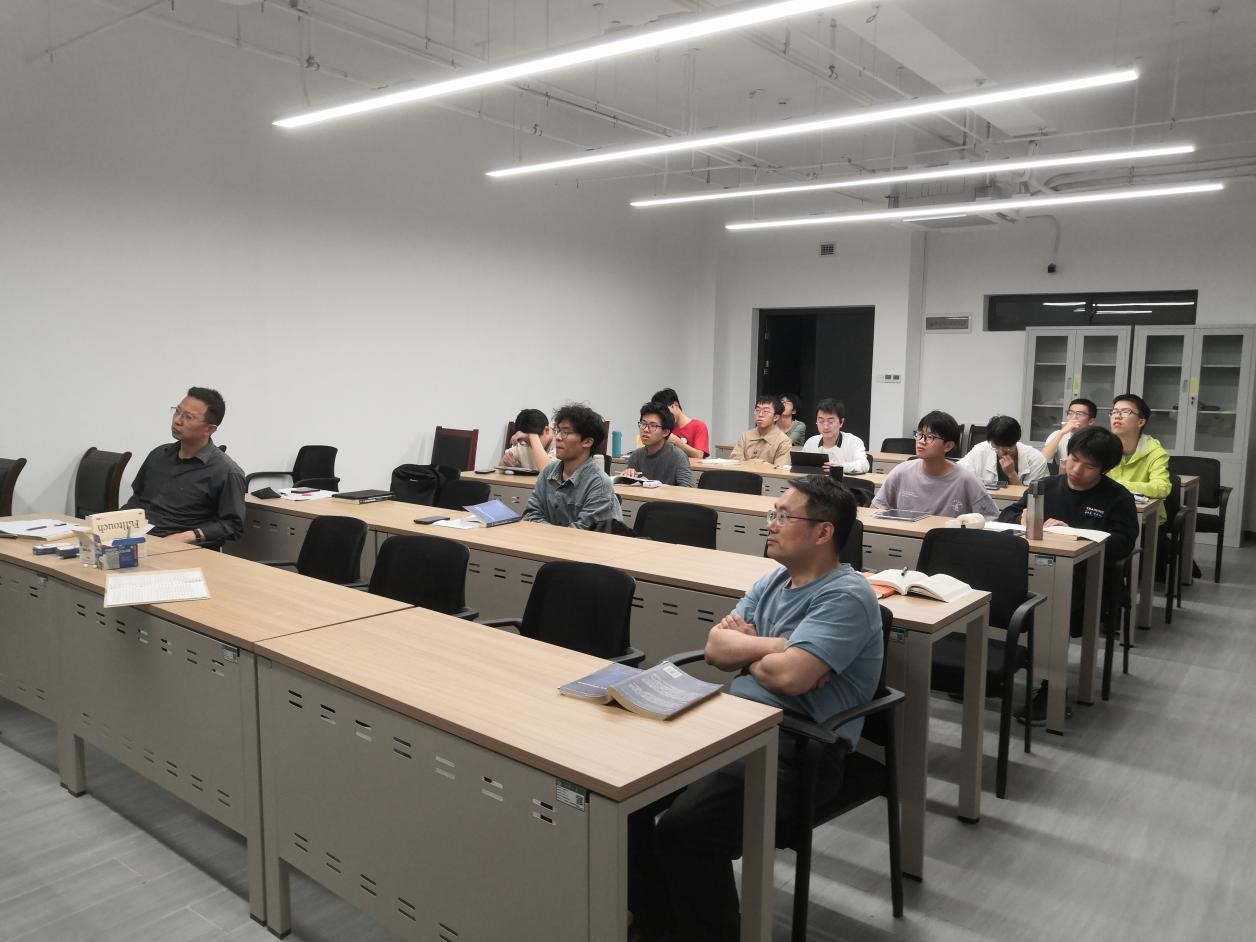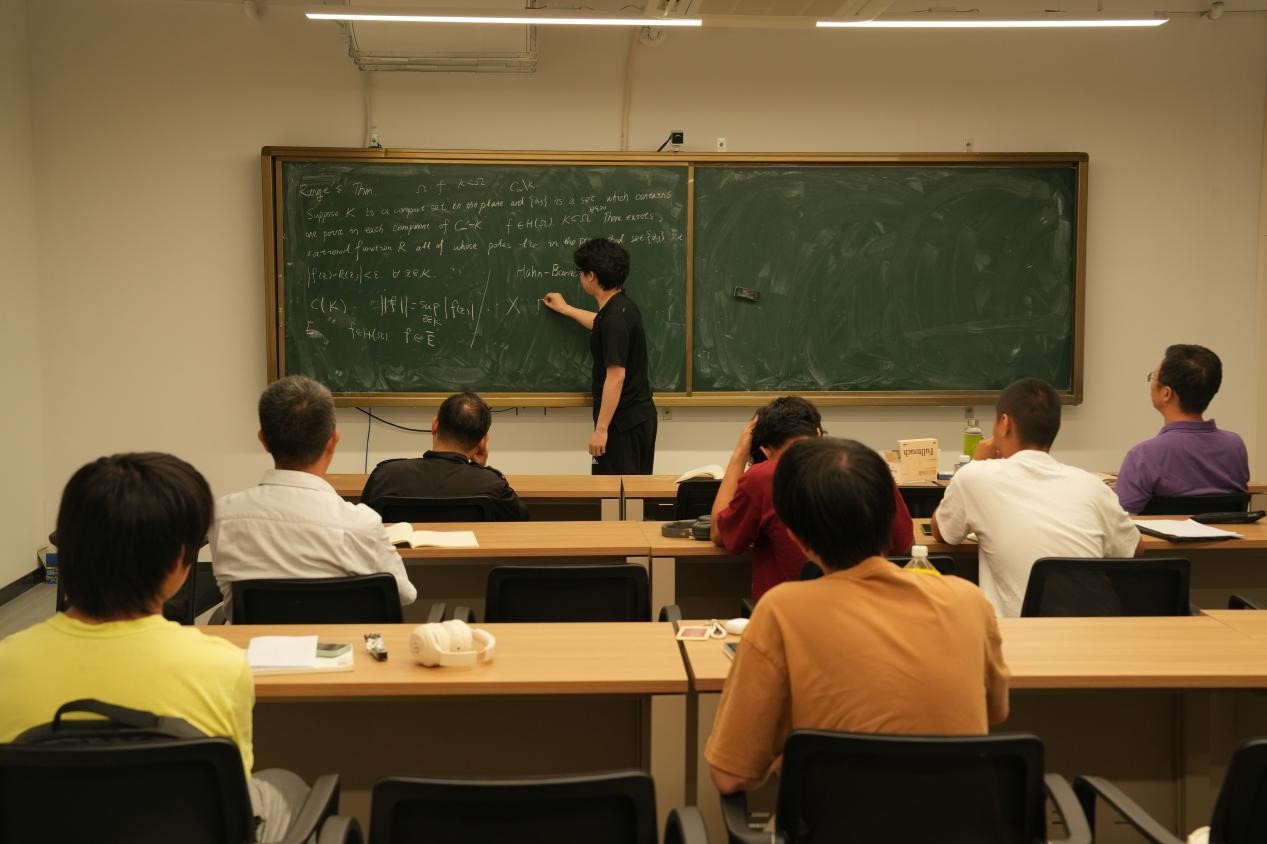As an important branch of modern mathematics, complex analysis studies functions whose independent and dependent variables are both complex numbers. As a key component of higher mathematics, complex analysis not only encompasses the core theories of differentiation and integration of complex functions, series expansions, analytic continuation, and residues, but also demonstrates irreplaceable theoretical value and wide-ranging practical applications in solving differential equations and advancing interdisciplinary fields such as fluid dynamics and electromagnetic theory.

This semester, under the joint guidance of Professors Zhang Zhongxiang, Gong Yafang, and Wang Yufeng, our department successfully conducted a seminar on “Entire Functions and Factorization in Stein Complex Analysis, the ζ-Function, and the Prime Number Theorem.” The seminar, designed for the 2023 cohort of the Mathematics and Applied Mathematics Honors Class, focused on cutting-edge topics in the theory of complex functions — including the factorization of entire functions, Jensen’s formula, the Gamma and ζ functions, and their profound connection with the distribution of prime numbers — through a systematic, progressively deepening series of lectures and discussions. This laid a solid foundation for students to pursue further mathematical research and tackle complex real-world problems.
The complex analysis seminar has been successfully completed in seven sessions. The first three sessions were led by Yu Leyuan, an undergraduate in the 2023 Mathematics and Applied Mathematics Honors Class, while the last four were co-led by Yu Leyuan and Fang Zijin from the same cohort. In the initial lectures, Yu Leyuan provided a rigorous and well-structured exposition of the theoretical foundations of factorization theorems, conducted an in-depth analysis of Jensen’s formula, and offered insightful interpretations of the nature of the zero distribution of entire functions. The seminar also focused on the Weierstrass Factorization Theorem in the complex plane, where Yu demonstrated the constructive approach behind its proof. Building upon this, Professor Zhang extended the theorem to the general case on simply connected domains using an existence-based method, offering original and enlightening theoretical insights. Notably, Fang Zijin proactively supplemented the detailed aspects of Professor Zhang’s explanations, showcasing the teamwork and deep engagement among the participating students.
In the later lectures, the Runge Theorem was introduced for the first time, along with key discussions summarizing major ideas related to the Hahn-Banach Theorem and the complex Riesz Representation Theorem. The lecturers also provided guidance on further literature review and advanced study pathways. Subsequently, Fang Zijin used recursive formulas as a starting point to carefully derive the analytic continuation of the Gamma function in the complex plane. By skillfully applying the Hadamard Factorization Theorem, she analyzed the factor structure of the reciprocal of the Gamma function, laying the groundwork for the deeper exploration of the ζ-function and the Prime Number Theorem that followed.
The seminar was distinguished by its well-organized structure, rigorous design, and emphasis on academic interaction. The student lecturers prioritized logical rigor and clarity of expression, ensuring that every theoretical conclusion was thoroughly derived and logically connected. The three mentors provided meticulous guidance, timely identifying gaps in reasoning and minor inaccuracies in expression during discussions and Q&A sessions, thereby significantly enhancing students’ problem awareness and research communication skills. Frequent interactions among faculty, senior students, and junior students greatly strengthened the participants’ teamwork, adaptability, and academic presentation abilities, providing valuable experience for future research training and academic exchange.

The successful completion of this complex analysis seminar not only deepened students’ understanding and mastery of advanced topics in single and complex variable function theory, but also greatly nurtured their enthusiasm and capability for engaging in fundamental mathematical research through intellectual exchange and academic exploration. By effectively integrating theory with practice, and explanation with interaction, the seminar comprehensively improved students’ research literacy, independent thinking, and collaborative skills. Such a series of academically rigorous and skill-oriented activities provides a solid platform for cultivating outstanding talents with global vision and innovative spirit, marking a significant milestone in our department’s efforts to enhance undergraduate research training.